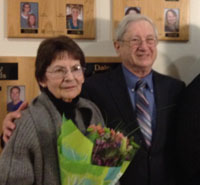A number of systematic reviews of lymphedema treatment protocols have been performed over the last decade. In essence, the conclusions of these systematic studies was that, although there is a paucity of high-level evidence, ALL of the considered physical therapy interventions (MLD, SLD, compression bandages, compression garments, decompression exercise) were effective in the treatment of lymphedema on some subset of the tested population.
Brennan 1996: Acquired lymphedema is a relatively frequent complication of axillary node dissection. Patients afflicted with this condition are prone to physical and psychological consequences, including pain, lost function, and depression. There is no cure for acquired lymphedema, but treatment options are available. Unfortunately, the evidence supporting many of these forms of treatment is less than optimal. Claims and counterclaims from biased practitioners have served to further muddy the waters, leaving many clinicians confused about the best options for their patients. A combination of garments, massage, and the appropriate use of sequential pumps at a sufficient pressure should form the core program for most patients with lymphedema. Though data supporting complex decongestive therapy is primarily anecdotal, it may be an option for some patients. However, its limited availability and significant cost preclude many patients from receiving it.
Megans & Harris 1998: Despite the relatively limited scientific evidence in support of physical therapy interventions for the management of lymphedema following breast cancer treatment, the following clinical recommendations are suggested: Physical therapists should encourage consistent and long-term use of compression garments in patients with lymphedema. Whether these garments need to be custom-fitted sleeves or standard-sized sleeves is not clear from the studies reviewed, nor is there consistency among the studies in the suggested amount of compression provided. Combined techniques, involving massage, sequential pneumatic compression, compression garments or compression bandaging, and exercise, may also be effective. It is not clear, however, whether such a combined program is actually more effective than a program involving pneumatic compression only followed by compression garments. Based on one study, modified CPT may be just as effective as standard CPT, and it is far less labor intensive and therefore less costly.
Erickson 2001: Non-pharmacologic treatments, such as massage and exercise, have been shown to be effective therapies for lymphedema. Complex physical therapy (also known as complex decongestive therapy, complex lymphedema therapy, multimodal physical therapy, complex decongestive physiotherapy, and complete decongestive physiotherapy), which consists of skin care, manual lymphedema treatment, exercises, and compression wrapping, followed by a maintenance program and psychosocial rehabilitation, has been recommended as a primary treatment by consensus panels and is an effective therapy for lymphedema unresponsive to standard elastic compression therapy. Complex physical therapy resulted in some volume reduction of the affected extremity in 95% of 399 patients (>50% reduction in 56% of patients, 25%–49% reduction in 31%, and 1%–24% reduction in 8%), 54% of whom maintained the therapeutic result at 3 years.
Karki 2001: In physical therapy various methods are used after a breast cancer operation. This systematic review aims to evaluate the effects of lymphedema therapy methods, postoperative shoulder exercise, exercise therapy, and aerobic exercise. The evolving data and calculations regarding the effect size support the delayed onset of postoperative shoulder exercise. Numerous studies concerning lymphedema therapy suffered methodological deficits. Elastic sleeve therapy is the only method shown to be effective when used alone. Treatment combinations were examined in many studies and treatment bias therefore restricted conclusions regarding the effectiveness of one method alone. Studies concerning exercise therapy and exercise were few and only two were true-experimental clinical trials. Three studies of exercise therapy showed in some measured variables that the experimental group had better results when following the effects of an exercise program for 1–3 months, although further conclusions were prevented because of the treatment bias.
Kligman 2004: Among the RCTs evaluating physical therapies, the only positive finding was an incremental benefit when an elastic sleeve was added to self-massage therapy. Pneumatic compression, compared with no intervention, was not associated with a significant improvement. However, the direction of the observed response rates and changes in arm volume favored pneumatic compression. Compression garments must be worn on a daily basis.
Badger 2004: One crossover study of manual lymph drainage (MLD) followed by self-administered massage versus no treatment, concluded that improvements seen in both groups were attributable to the use of compression sleeves and that MLD provided no extra benefit at any point during the trial. Another trial looked at hosiery versus no treatment. The authors concluded that wearing a compression sleeve is beneficial. The bandage plus hosiery versus hosiery alone trial concluded that in this mixed group of participants bandage plus hosiery resulted in a greater reduction in excess limb volume than hosiery alone and this difference in reduction was maintained long-term.
CHBRP 2005: Physical therapy interventions (outcome reduction in volume of edema) favorable for most interventions: Multi-layer bandaging favorable; Compression bandaging favorable; MLD ambiguous, mixed evidence, favorable for patients with mild lymphedema; Simple lymphatic drainage pattern toward favorable; Exercise pattern toward no effect, weak evidence; MLD+compression bandaging pattern toward favorable.
Moseley 2006: This systematic review undertook a broad investigation of commonly instigated conservative therapies for secondary arm lymphoedema including; complex physical therapy, manual lymphatic drainage, pneumatic pumps, oral pharmaceuticals, low level laser therapy, compression bandaging and garments, limb exercises and limb elevation. It was found that the more intensive and health professional based therapies, such as complex physical therapy, manual lymphatic drainage, pneumatic pump and laser therapy generally yielded the greater volume reductions, whilst self instigated therapies such as compression garment wear, exercises and limb elevation yielded smaller reductions. All conservative therapies produced improvements in subjective arm symptoms and quality of life issues, where these were measured. Evaluated by average volume change, all manual therapeutic protocols were beneficial (MLD + compression, CPT, MLD, IPC, compression, exercise and elevation--in order of efficacy). Level of Evidence was low (III-2 and III-3).
Florez-Garcia 2007: We reviewed the following databases: Medline, Physiotherapy Evidence Database and the Cochrane Library up to May 2006. We also made a used a complete web in Google. Articles selection. We found 15 randomized clinical trials, 4 systematic reviews, 3 clinical guidelines, 3 technological evaluations reports and 3 Cochrane Collaboration documents (1 review and 2 protocols). We did not find any high quality scientific evidence. The most reliable information available is based on randomized clinical trials with small samples. Follow- up was long term in only a few studies (equal or higher to one year). None of the studies used the blinded method, and only a few clinical trials used a "patients lost to follow-up" analysis. Physical therapy had a moderate effect on edema reduction. Compression garments are probably the main treatment. Using those garments we could expect stabilization and usually modest recovery. There is a weak and contradictory evidence of the short-term utility of manual lymph drainage and external pneumatic compression. Complete decongestive therapy has shown no special utility versus the simpler alternatives. Arm elevation and exercises may produce a small improvement in combination with other techniques. The positive results observed with laser therapy are still very preliminary.
Hayes 2008: In summary, research on the effects of complex physical therapy, manual lymph drainage, compression and massage as options for the management of secondary lymphoedema has produced consistent results, with volume reductions demonstrated. However, the low level evidence (Level III-1 or lower studies) and the focus on only breast cancer patients, limits the generalizability of these findings. There is also the potential for over-reporting of positive treatment effects given that the characteristics of those lost to follow-up were not presented.

